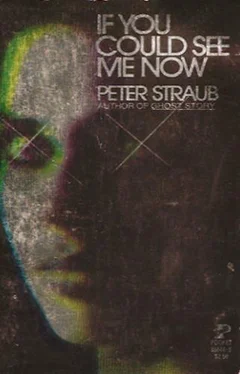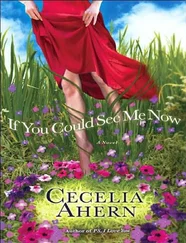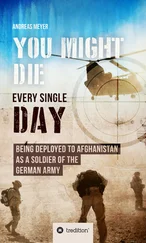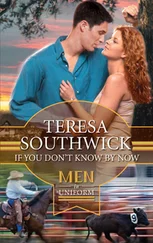“What are you going to do? Just wait until they break in and do whatever it is they have in mind?”
“What I’m going to do is wait it out,” he said. “It’s what I’m best at, after all. When they finally catch whoever it is, maybe I’ll get my job back. What are you going to do?”
“I don’t know,” I admitted. “I thought we might be able to help each other. If I were you I’d scram out of the back door in the middle of the night and go to Chicago or someplace until it’s all over.”
“My car won’t move. And even if it did, I’d be picked up in a day or two.” He sent me that ghastly smile again. “You know, Miles, I almost envy that man. The killer. I’m almost jealous of him. Because he wasn’t too afraid to do what he had to do. Of course he is a beast, a fiend I suppose, but he just went ahead and did what he had to do. Didn’t he?” The small monkey’s face was pointing at me, still wearing that dead smile. Mixed in with the smells of dust and old lady’s possessions was the odor of long-dead flowers.
“Like Hitler. You sound like you should talk to Zack.”
His expression altered. “You know him?”
“I’ve met him.”
“I’d keep away from him.”
“What for?”
“He can hurt you. He could hurt you, Miles.”
“He’s my biggest fan,” I said. “He wants to be just like me.”
Paul shrugged; the topic no longer interested him.
I said, “I think I’m wasting my time.”
“Of course you are.”
“If you ever need help, Paul, you can come out to the Updahl farm. I’ll do whatever I can.”
“Neither one of us can help the other.” He looked at me blankly, wishing I would leave. After a moment he spoke again. “Miles, how old was your cousin when she died?”
“Fourteen.”
“Poor Miles.”
“Poor Miles, bullshit,” I said, and left him sitting there with the cigarette smoke curling around him.
Outside the warm air smelled unbelievably fresh, and I recognized that my chest was tight, clamped by an emotion too complex to identify. I inhaled deeply, going down Paul’s wooden steps to his tiny yard. It seemed to me that I could almost hear the paint peeling off that hopeless house. I looked both ways, knowing that if anyone spotted me I was in trouble, and saw something I hadn’t noticed when I had come in. In a corner of the yard beside Paul’s low fence was a doghouse, empty and as in need of paint as the house. A chain staked to the front of the doghouse trailed off into the weeds and bushes beside the fence. The chain seemed taut. The hairs on the back of my neck rose, and I was aware of the texture of the shirt next to my skin. I did not want to look, but I had to. I took two steps across the dying lawn. It was lying in the weeds with the chain around what was left of its neck. Maggots swarmed over it like a dirty blanket.
The tightness in my chest increased by a factor of ten, and I got out fast. The dreadful thing stayed in my vision even when my back was turned to it. I went through the gate and began to walk quickly down the alley. It had been a wasted gesture, the visit. I wanted only to get away.
When I was no more than thirty feet from the end, a police car swung in front of me, blocking off the alley. A big man sat at the wheel, twisting his body to look at me. I was in full light, fully visible. I automatically felt guilty and afraid, and swiveled sideways to look down to the alley’s other end, which was clear. I looked back at the man in the police car. He was motioning for me to approach him. I walked toward the car, telling myself that I had not done anything.
When I got closer, I saw that the man was Polar Bears, in uniform. He swung open the passenger door and circled a forefinger in the air, and I walked around the front of the car and got in beside him. “You’ve had brighter ideas,” he said. “Suppose someone saw you? I’m trying to keep you from getting your head busted in.”
“How did you know I was here?”
“Let’s say it was a guess.” He looked at me in a kindly, almost paternal fashion which was as genuine as a glass eye. “I got a call about an hour ago from a boy works at the filling station. Boy named Hank Speltz. He was a little upset. It seems when you brought in that VW, you gave him a phony name.”
“How did he know it was phony?”
“Oh, Miles,” Polar Bears sighed. He started up the car and rolled away from the curb. At the corner he swung into Main Street and we purred gently along past Zumgo’s and the bars and the bakery and the Cream City brick facade of the Dairyland Laboratories. “You’re a famous man, you know. You’re like a movie star. You have to expect to be recognized.” When we reached the courthouse and the city hall, he did not pull into the police parking lot as I had expected, but kept going on over the bridge. On that side of Arden, the shops drop away fast, after you pass the bowling alley and the restaurants and a few houses, and you are back in open corn country.
“I don’t think it’s a crime to have a car repaired under an assumed name,” I said. “Where are we going, anyhow?”
“Just for a ride around the county, Miles. No, it’s no crime, that’s right. But since damn near everybody knows who you are, it’s not very effective either. It just makes boys like Hank, who aren’t too well supplied upstairs, sort of suspicious. And Miles, why in hell did you use that name?” On “hell” he banged one of his fists into the steering wheel. “Huh? Answer me that. Out of all the names you could have picked, why the devil did you pick Greening? That’s what you don’t want to remind people of, boy. I’m trying to keep all that in the background. We don’t want that to come out.”
“I think it came out the first second I showed up in Arden.”
Polar Bears shook his head, disgusted. “Okay. Let’s forget it. I told that Hank kid to forget about it. He’s probably too young to know about it anyhow.”
“So why are you upset?”
“Forget about my problems, Miles. Let’s see if we can get any work done. You learn any thing talking with Paul Kant?”
“He didn’t do anything. He certainly didn’t kill anybody. He’s a sad frightened man. He isn’t capable of anything like these killings. He’s too scared to do anything but shop for his groceries.”
“Is that what he told you?”
“He’s too frightened even to bury his dog. I saw it just when I was leaving. He couldn’t kill anybody.”
Polar Bears tilted his hat back and hunched clown further on the seat. He was too big to fit comfortably behind a steering wheel. By now we were well out in the country, and I could see the broad loops of the Blundell River between trees. “Is this where the fishermen found the body of the Olson girl?”
He tilted his head and looked at me. “No. That was a couple miles back. We passed the spot about five-six minutes ago.”
“On purpose?”
“On purpose for what?”
I shrugged: we both knew.
“I think our friend Paul might not have told you all the truth,” Polar Bears said. “If he was going out grocery shopping, wouldn’t he manage to buy some dogfood?”
“What are you saying?”
“Did he offer you anything when you were visiting? Lunch? A sandwich? Coffee?”
“No. Why?” Then I saw why. “You mean he doesn’t leave his house? You mean his dog starved to death?”
“Well, it might of starved, or somebody might of helped put it out of its misery. I don’t know. But I do know Paul Kant hasn’t been out of his house in about a week. Unless he sneaks out at night.”
“What does he eat?”
“Damn little. I guess he must have some canned stuff in his kitchen. That’s why you didn’t get any lunch out of him. He’s screwed down pretty tight.”
Читать дальше












